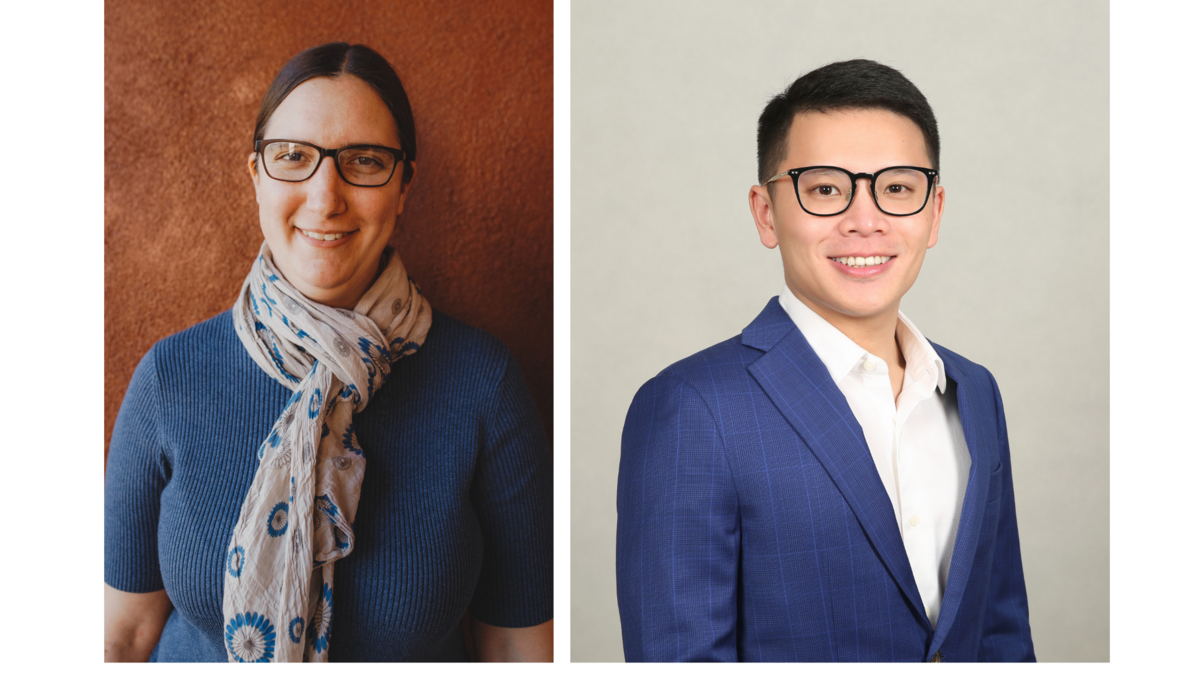2 ASU faculty awarded prestigious fellowships for research in history, religious studies

Hannah Barker (left), associate professor of history, and Han Hsien Liew (right), assistant professor of religious studies, will be fellows at the Institute for Advanced Study beginning in fall 2024. Courtesy photos
Two faculty from the School of Historical, Philosophical and Religious Studies at Arizona State University have been awarded distinguished fellowships at the Institute for Advanced Study beginning in fall 2024: Hannah Barker, associate professor of history, and Han Hsien Liew, assistant professor of religious studies.
Each year, the Institute for Advanced Study, or IAS, welcomes more than 250 of the most promising postdoctoral researchers and distinguished scholars from around the world to advance fundamental discovery as part of an interdisciplinary and collaborative environment.
Visiting scholars are selected through a highly competitive process and selected by permanent IAS faculty. Research at the IAS is conducted across four schools — historical studies, mathematics, natural sciences and social science. This prestigious membership allows for focused research and the open exchange of ideas among an international community of scholars.
Both scholars will use the dedicated time to write and research material for major works-in-progress: Barker will begin work on her second book and Liew will finish his first.
Barker’s project, titled “Freed or Free: Slavery and Changes of Legal Status in Medieval Genoa,” will examine how enslaved people in the region used petitions to challenge and sometimes overturn their enslaved status. She will be the first English language scholar to write a book on this subject, as very little scholarship exists in this field, even in other languages.
“This is a dream,” Barker said. “The time and the resources that (the IAS) provide(s) will be invaluable for making progress on my book. It’s a great honor to receive this fellowship and I’m very excited for my year there.”
Liew’s book-in-progress is titled “Preaching Pious Rulership: Piety and Emotions in Ibn al-Jawzi’s Political Thought” and focuses on the rhetoric used by preachers in the medieval Islamic world, especially the intentional use of emotional language in their sermons, and examines how this impacted Islamic political thought at the time while also drawing comparisons to Western ideologies. Liew sought out support from the Humanities Institute at ASU, which supports research and creative engagement, while working on his proposal for the IAS.
"As a junior scholar, receiving a fellowship from a prestigious institution like the IAS gave me a huge boost of confidence in my own work,” Liew said. “I am looking forward to my time there to finally finish writing my book. I am also excited to meet and connect with other members in my fellowship cohort and other scholars in the greater New York and New Jersey area.”
Among past and present IAS scholars, there have been 35 Nobel laureates, 44 of the 62 Fields Medalists, and 23 of the 27 Abel Prize laureates, as well as MacArthur and Guggenheim fellows, and winners of the Wolf, Holberg, Kluge and Pulitzer prizes.
“(The school) is proud to be so well-represented at the Institute for Advanced Study,” said Richard Amesbury, director of the School of Historical, Philosophical and Religious Studies and professor of philosophy and religious studies. “Professor Barker and Professor Liew are among the nation's leading historians, and their work promises to expand our understanding of the past in ways relevant to the present.”
More Arts, humanities and education

ASU’s Humanities Institute announces 2024 book award winner
Arizona State University’s Humanities Institute (HI) has announced “The Long Land War: The Global Struggle for Occupancy Rights” (Yale University Press, 2022) by Jo Guldi as the 2024…

Retired admiral who spent decades in public service pursuing a degree in social work at ASU
Editor’s note: This story is part of coverage of ASU’s annual Salute to Service.Cari Thomas wore the uniform of the U.S. Coast Guard for 36 years, protecting and saving lives, serving on ships and…

Finding strength in tradition
Growing up in urban environments presents unique struggles for American Indian families. In these crowded and hectic spaces, cultural traditions can feel distant, and long-held community ties may be…